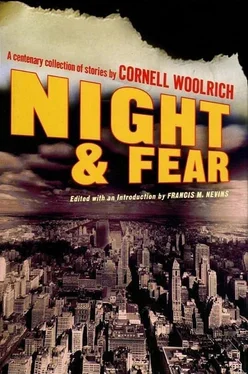It was strangely deserted: seemed so, at least, until Hollinger remembered that most of the usual crowd must have been drawn around to the front of the Stolen Hours by the hubbub. They ran down it to the end of the block, then turned a corner into another that was even more dismal. But this one was more normally crowded. Heads turned after them, kimonoed passersby stopped to stare. A zigzagging bicycle-rider tried to get out of their way, ran into them instead and was toppled over.
“If the alarm spreads before we can get out of this part of town, we’re sunk.” he panted. “They’ll gang up on us. Faster, lady, faster—”
“I can’t,” she whimpered. “It’s... it’s this pavement — the ground’s cutting my feet to pieces—” He was without shoes, too, but his soles were calloused from deck-scrubbing. He was two arms’ length in front of her, hauling her after him by the combined span of his own arms and hers. Betraying flashes of gold peeped out from under the parachuting kimono, were blazing a trail of identification behind them.
She stumbled and bit her lips to keep from crying out. So he grabbed her up in both arms, plunged onward with her. The extra weight hardly slowed him at all. A paper streamer hanging downward across the lane got snared in some way by their passage, ripped off its wire and flared out behind his neck like a long loose muffler. The shopkeeper whose stall it had advertised came out sputtering, both arms raised high in denunciation.
“There’s our dish!” he muttered, winded. A taxi had just dropped a couple of fares in front of a dancehall ahead. Hollinger hailed it with a hoarse shout and it came slowly backward. Hollinger let the girl fall on the seat, ran along beside the cab for a minute as the driver went forward again, then hopped in after her.
“Drive like blazes,” he panted. “Ginza — anywhere at all — only get us out of here. Fast, savvy?”
“I go like wind,” the driver agreed cheerfully. He wore a kimono and a golf-cap.
The girl was all in; the sudden release of all the pent-up tension finished the last of her control. She just lay inertly, hiding her face with both her hands. He didn’t speak to her or try to touch her. His head back against the cushion he pulled in eight long, shuddering breaths — slowly, tasting each one like a sip of icy wine. After that, he began to lick the ugly teeth-gashes on his hand.
A sudden diminution of the light around them — a change to the more dignified pearly glow of solitary streetlights — marked the end of the Yoshiwara.
At the end of a long five minutes, the girl pulled herself up. “I don’t know how to thank you,” she said weakly. “I mean” — she smiled just a little, wearily — “there just aren’t any words.”
“Who does things for thanks?” he said, spading his hand at her.
She said what she’d said before: “I didn’t do it. I know I didn’t do it! Why, I was going to marry Bob. I loved him—” She stopped suddenly, confused.
He looked at her sharply, but he didn’t ask any questions. He started, though, to reach for her hand, then drew back.
They were coming into the long broad reaches of the Ginza now, Tokyo’s Broadway. The lights brightened again, but with a difference: This was downtown, the show-part of town, modern, conventional, safe. Safe for those who weren’t wanted for murder, anyway.
“I suppose I ought to give myself up to the police,” she said, her eyes restless, like an animal in a trap. “The longer I keep running away, the more they’ll think I did do it — I lost my head in that dreadful place — the knife on my lap and his blood on my dress, and that horrible manager yelling at me.”
“Suppose you tell it to me first,” he urged, gently. “I’m sticking with you, see? I didn’t go through all that trouble just to have you put into jail. You say you didn’t do it. All right — that’s good enough for me. I don’t know who you are—”
“Brainard,” she said. “Evelyn Brainard. I’m from San Francisco.”
He said something that should have been very funny, after what had gone on during the half hour, but she didn’t laugh. “Pleased to meet you, Miss Brainard,” said he, and blanketed one of her hands in the enormous expanse of his. Etiquette.
“If you give yourself up now, I won’t have time to do anything for you. I’m due back on shipboard tomorrow noon, and we’re pulling out for Chefoo right away after that. You’d just stay cooped up until the American consul gets good and ready to ask what they’re going to do about you, and that might be a week — ten days. And then he probably wouldn’t take as much personal interest in you as” — he faltered awkwardly — “as a fellow like me would, that has met you socially.”
This time she managed a warm smile, “Socially? Well, that’s one way to put it, I guess.”
“I ought to be able to straighten it out for you between now and the time I go back,” he said earnestly. “Look, I’ve answered four questionnaires already on how to be a detective. I only have one more to go before I’m finished the course. And I’ve passed three of ’em, I know for a fact.”
They had reached the lower end of the Ginza already, were heading slowly back again.
“The first thing we’ve got to do is get you off the streets, otherwise you’ll be picked up in no time. Know anyone at all here you could hole up with?”
“Not a living soul. Bob Mallory was the only one. I just got off the Empress yesterday afternoon. I’ve a room at the Imperial—”
“No, you better not go back there. They’re either there already looking for you or they will be any minute. What about this Mallory — where did he hang out?”
“I don’t know, he wouldn’t tell me. He gave me an evasive answer when I asked him. Somehow I got the idea he didn’t want me to find out—”
He gave her another look. “It wouldn’t be much help, even if you did know. It’s probably the first place they’d look for you.” They drove on in silence for a minute. Finally he said, “Look, don’t be offended, but I’ve had a room since yesterday. It’s not much of a place — it’s run by a crazy darn’ Russian. But it would be somewhere for you to be safe in while I’m trying to see what I can do for you.”
“You’re swell.”
He gave the driver the address. It was a western-style building in one of the downtown reaches of the city, little better than a shack, really — clapboard under a corrugated tin roof. But at least it had wooden doors and walls. And windows with shades on them.
He said: “Wait in the cab a minute, I’ll get the Russian out of the way. Just as well if no one sees you going up.”
After he’d gone in, she caught sight of the driver slyly watching her in his rear-view mirror. She quickly lowered her head, but with the creepy feeling that he already knew she was white, even in the dimness of the vehicle’s interior. Hollinger came back and helped her out. “Hurry up. I sent him out to the back on a stall—”
Going up the unpainted wooden stairs — the place had an upper story — she whispered: “The driver saw I wasn’t Japanese. He may remember later, if he hears—”
He made a move to turn and go down again. The sound of the taxi driving off outside reached them, and it was too late to do anything about it.
“We’ll have to take a chance,” he said.
There was nothing Japanese about the room upstairs. Just a typical cheap lodging-house room, the same as you’d find the world over. An electric bulb under a tin shade. Flaked white-painted iron bedstead, wooden dresser.
She sat on the edge of the bed, wearily pulled off the white cap. Her golden hair came out and made her beautiful again. He drew up a chair, leaned toward her, arms akimbo, poised on his knees. He said, “What happened? Tell me the whole thing from the beginning. See if I can get the hang of it. Talk low.”
Читать дальше












